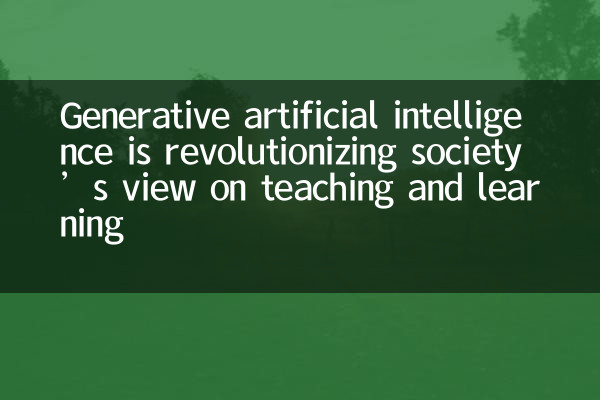Generative artificial intelligence is revolutionizing society’s view on teaching and learning
In recent years, the rapid development of generative artificial intelligence (such as ChatGPT, MidJourney, etc.) is profoundly affecting the field of education. From personalized learning to automated evaluation, AI technology not only redefines teaching methods, but also subverts the inherent model of traditional education. The following are related topics and structured data that have been hotly discussed across the Internet in the past 10 days, showing the core trend of this change.
1. Check out the hot topics

| topic | Discussion popularity (index) | Main controversy points |
|---|---|---|
| Ethical controversy over AI-assisted assignments | 92.5 | Is it an academic cheating? |
| Teacher role transformation | 88.3 | From a knowledge imparter to a learning guide |
| Personalized learning system | 95.1 | Data Privacy and Algorithm Bias |
| AI Generation Textbook | 76.8 | Content accuracy and copyright ownership |
2. Three major directions of change in the field of education
1. Disruptive innovation in teaching models
The traditional one-way model of "teacher speaking-student listening" is being replaced by two-way interaction driven by AI. For example, an experiment from a university in the United States showed that students' participation in classes using AI tutoring systems increased by 40%, while teachers can spend 60% of their time on targeted Q&A.
2. Paradigm transfer of evaluation system
Standardized examinations are challenged, and dynamic assessments have become a new trend. According to the latest survey:
| Evaluation method | Adoption rate (2023) | growth rate |
|---|---|---|
| AI real-time learning analysis | 37% | +210% |
| Traditional written test | 68% | -15% |
3. The process of democratization of educational resources
AI translation and content generation technologies are breaking language barriers. Data from an open course platform shows that non-English courses have grown by 300% with AI assistance, and the proportion of users in developing countries exceeds 50% for the first time.
3. Controversy and Challenge
Despite the broad prospects, AI education still faces multiple challenges:
| Question Type | Typical cases | Solution Exploration |
|---|---|---|
| Technology dependence risk | Students' critical thinking declines | Hybrid teaching design |
| Digital Divide | Difficulty in accessing underdeveloped areas | Lightweight AI tool development |
4. Future prospects
Educational technology experts predict that by 2025, AI will be deeply integrated into 90% of teaching scenarios. But the key lies in building a new ecosystem of "human dominance and AI enhancement", rather than a simple replacement. As an educator said, "Technology should be as ubiquitous as oxygen but not easy to detect. What really matters is always the humanistic core of education itself."
This educational revolution triggered by generative artificial intelligence is redefining the way knowledge is acquired, created and disseminated. Society needs to establish a new cognitive framework in order to seize opportunities and meet challenges in this change.

check the details

check the details